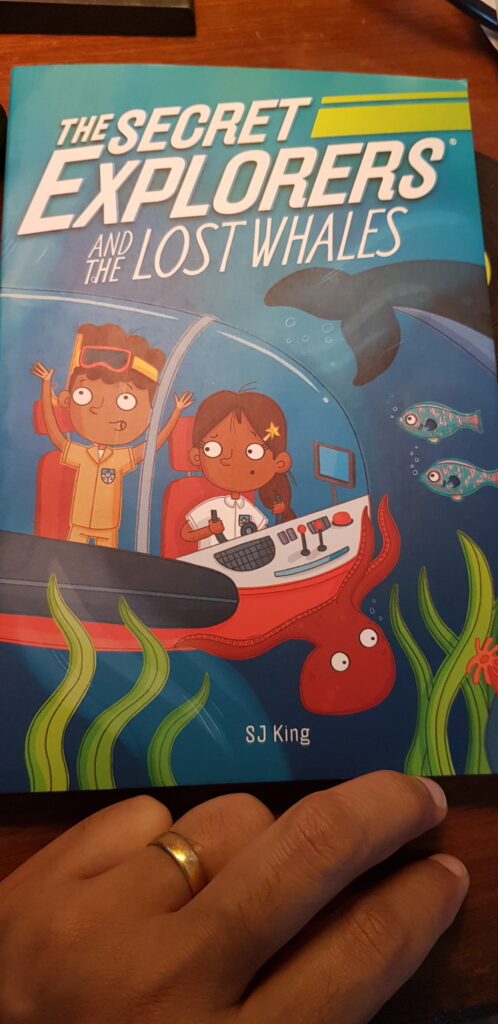“The Secret Explorers and the Lost Whales” by S J King
In late Sept 2020, a pod of approximately 400 pilot whales beached on the west coast of Tasmania.

Beaching of whales is an inexplicable phenomenon. For decades scientists have been studying whales but they continue to be baffled by this behaviour of the mammals. The September event was heartbreaking as some of the whales freed by rescuers, returned to the beach once more. Ultimately, a few were set free but they were only a tiny proportion of the pod. The remaining had either died or had to be euthanized as they were too weak to survive any more.
I was reminded of this sad event while reading The Secret Explorers and Lost Whales by SJ King. It is a fictional account of group of children who gather from around the world and embark upon different missions. They are the secret explorers who have their favourite areas of research — Connor ( oceanography), Tamiko ( dinosaurs / paleontology), Kiki ( machine and technoloy), Leah ( plants and animals / ecology), Ollie ( rainforests/ biologist), Roshni ( astronaut), Gustava ( history) and Cheng ( rocks and volcanoes / geomorphology). They are teamed up depending upon the mission. The Exploration Stations always picked the two members with the right skills and knowledge for the mission. They set off in their trustworthy Beagle, named after the ship used by Charles Darwin on hit missions. But the Beagle behaves like the Magic School Bus, a significantly successful landmark in contemporary children’s literature and edutainment.

This is the first in a series launched by Dorling Kindersley, Penguin Random House. The series has been conceived and written by SJ King. In The Lost Whales, marine life expert Connor and companion Roshni need to use Connor’s underwater expertise and her navigation skills to help save a pod of humpback whales that have lost their way. They set out in the Beagle to search for a way to steer the whales back on track, but encounter unexpected problems along the way, including a lost baby whale and a fleet of boats that could again send the whales off course.
The book is a delightful mix of storytelling and information. With great ease little details of oceanography such an explanation for red tide is offered in the book. There are descriptions of the whales as well as astonishment of the children upon hearing the humpback whales communicate. ( Listen to this BBC radio documentary that celebrates 50 years of bioacoustician and marine biologist Roger Payne’s extraordinary recording of humpback whales in 1967. It was released as an album in 1970 and went multi-platinum!) The thrill of an adventure coupled with a mission are beautifully told in this storybook. The last few pages are dedicated to outlining important facts of the ocean mentioned in the story and that could have been missed by a reader. These are very neatly presented as “Mission Notes”.
Slim little book that is packed with information and seems to be worth the price. Apart from being a phenomenal resource tool for children. Perhaps even inspirational for the choices they make in the future when deciding upon careers.
Now only if the fictional account of steering the whale pod to safety had been easy to replicate in real life, then perhaps the lives of 400 pilot whales beached in Tasmania could have been saved.
4 October 2020

No Comments